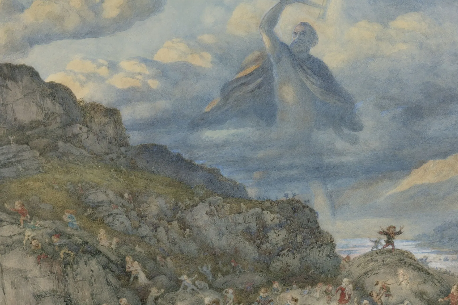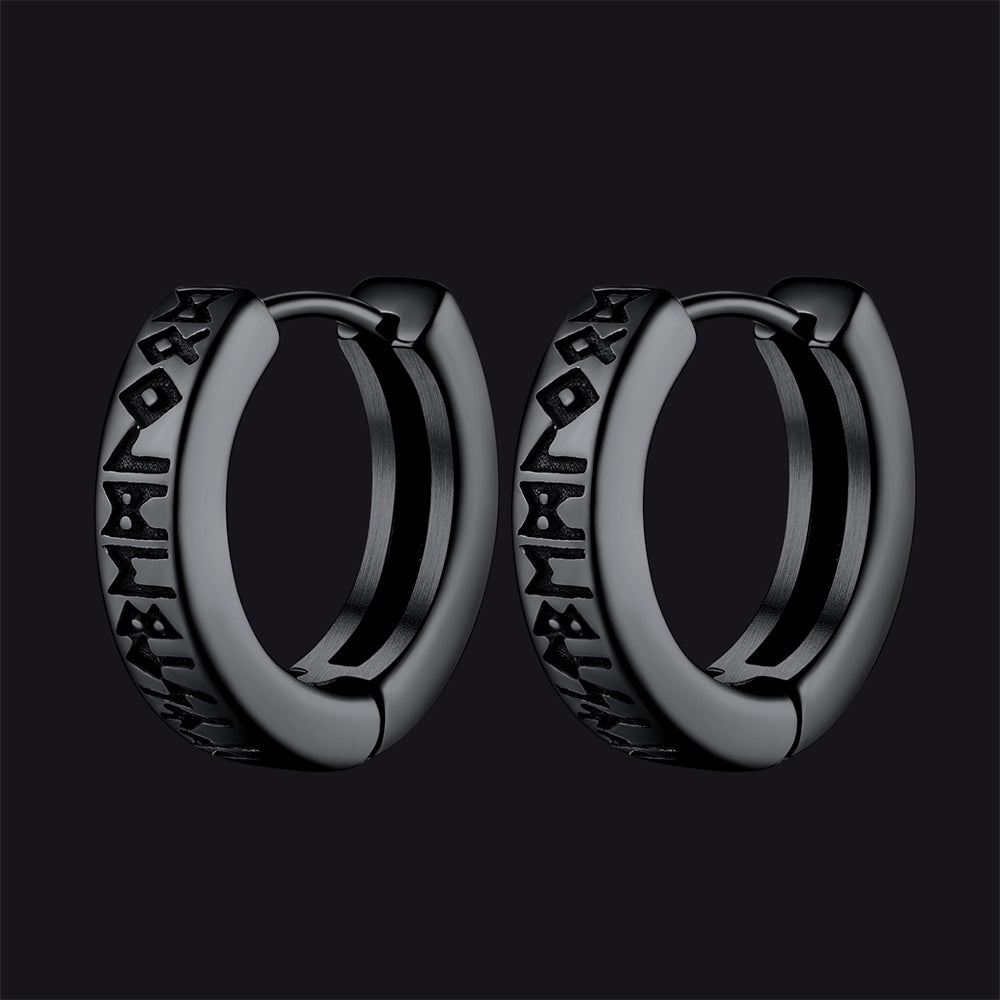Norse Mythology Explained: A Beginner's Look at Odin, Thor, and the Viking Cosmos
You may have seen powerful thunder gods and clever tricksters in movies. But their real stories come from old Norse myths, which are more epic and brutal. These tales were important to the Vikings. They tell of gods who could die, a future that couldn't be changed, and a world fated to end in fire. This text will show you how their universe was born, the nine realms it held, its most famous gods, and their last great battle, Ragnarök.
In the Beginning – The Norse Creation Story
The Norse tale of creation starts not with light, but with the clash of simple fire and ice.
From Emptiness to Everything
At first, there was only Ginnungagap, a huge empty space. To the north was Niflheim, a place of endless ice and fog. To the south was Muspelheim, a land of constant fire and lava. The cold from Niflheim and the heat from Muspelheim crept toward each other. They met in the middle of the great emptiness. The fire melted the ice, and life formed from the dripping water.
The First Beings
From these drops, Ymir was formed. He was the first being and the father of all giants. He was huge and wild. While he slept, more giants grew from his armpits. The melting frost also made Audhumla, a giant cow. Four rivers of milk flowed from her, which gave Ymir food. Audhumla ate by licking salty ice blocks. As she licked, she uncovered a figure in the ice. This was Búri, the first of the gods.
The Dawn of the Gods
Búri had a son named Bor. Bor married a giantess, and they had three sons: Odin, Vili, and Vé. These brothers were the first of the Æsir gods. They saw that Ymir was a destructive force, so they fought and killed him. A flood of his blood drowned all the giants except for two. Odin and his brothers then used Ymir's body to build a new world. His flesh became the earth, his blood became the oceans, and his bones became the mountains. They used his skull to make the sky and put sparks from Muspelheim inside it to create the sun, moon, and stars.
The Cosmic Skeleton – Yggdrasil and the Nine Realms
After the lands were made, the gods needed something to hold their new creation together. This structure was Yggdrasil, the great World Tree. It was the center of everything in the Norse reality.
Yggdrasil, The World Tree
Yggdrasil is a giant ash tree. Its branches cover all the nine realms, and its roots go deep into the universe. It is the pillar of existence. An eagle sits at its top, a squirrel named Ratatoskr runs up and down its trunk, and a dragon called Níðhöggr chews on its roots. Yggdrasil connects all places and all beings.
A Tour of the Nine Realms
The World Tree holds up nine different realms, and each is a home to its own kind of beings.
- Asgard: This is the home of the Æsir gods, ruled by Odin. Asgard contains Valhalla, the famous hall where warriors chosen after dying in battle go to feast.
- Midgard: Midgard is the realm of humans, much like our own Earth. A fiery rainbow bridge, the Bifröst, links it to the gods in Asgard.
- Jötunheim: Jötunheim is the rugged land of the giants. It's a chaotic place and a constant danger to the gods.
- Vanaheim: Vanaheim is the home of the Vanir, a different group of gods tied to nature and fertility.
- Alfheim: Alfheim is the bright and shining home of the light elves.
- Svartalfheim: This is a kingdom deep underground, the domain of the dwarves. These dwarves are master smiths, known for creating incredible treasures for the gods.
- Niflheim: Niflheim is the ancient realm of ice and mist, located deep at the bottom of the cosmos.
- Muspelheim: This is the primordial land of fire and lava, ruled by the giant Surtr.
- Helheim: Helheim is the grim domain of the dead. It's ruled by Loki's daughter, Hel, and it's the final stop for people who die from sickness or old age.
The Pantheon – Meeting the Gods and Giants
The realms had powerful inhabitants, but the most important were the gods. The Norse gods weren't perfect. They had their own ambitions and flaws, along with futures they could not escape.
Odin, the All-Father
Odin is the leader of the Æsir gods. He is the god of wisdom, war, poetry, and death. Odin always craved more knowledge. To get it, he famously traded one of his eyes for a drink from the Well of Mimir, which gave him incredible wisdom. He is usually seen with his two ravens, Huginn (Thought) and Muninn (Memory), who fly across the realms to bring him news.
Thor, the Mighty God of Thunder
Thor is Odin's son and the god of thunder. He is the protector of mankind. He is known for his great strength and quick temper. His main weapon is the hammer Mjölnir, which comes back to his hand after he throws it. He has a pair of iron gloves to hold the hammer and a belt that doubles his strength. He is the greatest enemy of the giants.
Loki, the Cunning Trickster
Loki is a tricky god to figure out. He is a giant by birth, but he's also Odin's blood-brother, so he lives in Asgard. As a clever shape-shifter, you can never be sure whose side he's on. He often causes huge problems for the other gods, but sometimes his cleverness is the only thing that can solve them. Loki is also the father of three monstrous children who play a big part in the world's end: the wolf Fenrir, the serpent Jörmungandr, and Hel, the ruler of the dead.
Other Key Deities
Other gods were important, too. Frigg, Odin's wife, is the goddess of marriage. Freya is a goddess of love and war, and she chooses half of the dead warriors for her hall. Tyr is the god of law and bravery. He lost his hand when he helped trick the wolf Fenrir into being tied up.
Inevitable Doom – The Prophecy of Ragnarök
A dark idea runs through the Norse tales: fate. Not even the gods could escape their end. Ragnarök, or the "Twilight of the Gods," is the story of the world's end, an event that was foretold long ago.
The Signs of the End
The end begins after the death of Baldur, Odin's favorite son. Loki's tricks caused his death, and this broke the peace in Asgard. The first big sign of Ragnarök is Fimbulwinter, which is three straight years of winter with no summer. The world falls into chaos, and people turn on each other.
The Final Battle
When the time comes, the wolf Fenrir will break free. The World Serpent Jörmungandr will rise from the sea. Loki will arrive with an army of the dead. The fire giant Surtr will come to burn the world. The god Heimdall will blow his horn, and the gods will gather for their last fight. Odin will be eaten by Fenrir. Thor will kill the serpent Jörmungandr but will die from its poison. Loki and Heimdall will kill each other.

Destruct![]() ion and Rebirth
ion and Rebirth
As the gods fall, the world is burned and sinks into the sea. It is a complete end. But it is not the final story. A new, green world will rise from the water. A few gods will survive. Two humans, Líf and Lífþrasir, will come out of hiding to start humanity again. So, Ragnarök is not just an end; it is also a new beginning.

Echoes of Asgard – The Viking and Modern Influence
These stories were a big part of how the Vikings saw the world. We can still see their influence in our culture today.
The Heart of the Viking Spirit
The myths helped shape Viking values. The gods faced their doom with courage, and this taught people to be brave. The idea of Valhalla, where brave warriors would feast after death, made dying in battle seem glorious. For Vikings, honor was the most important thing.
Norse Fingerprints on Our World
We can still see traces of these old beliefs. For example, some names for the days of the week in English come from Norse gods:
- Tuesday is from Tyr's Day.
- Wednesday is from Woden's Day (Woden is another name for Odin).
- Thursday is from Thor's Day.
- Friday is from Frigg's Day.
The ideas in these myths have also shaped many modern fantasy stories. The way we think of dwarves as skilled smiths and elves as graceful beings comes from these tales.
Final Thoughts on Norse Mythology
Norse mythology is a collection of stories about creation, complex gods, and a great fight against a future that cannot be changed. It shows a world where people found value in being brave because they knew their time was short. The lesson was that even when you know you will lose, there is honor in fighting well.



